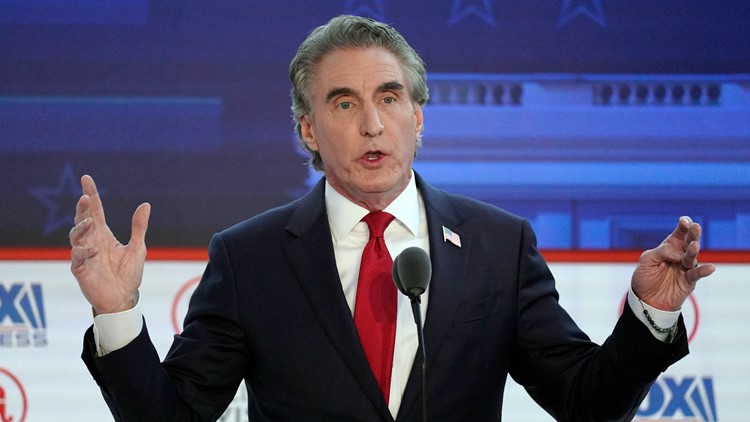BISMARCK, N.D. — North Dakota Gov. Doug Burgum ended his long-shot presidential campaign on Monday, blaming his inability to resonate in the race on the Republican National Committee’s strict requirements to qualify for the debate stage.
The second-term governor and wealthy software entrepreneur dropped his bid just hours before the RNC was to release the list of candidates who had met the polling and donor qualifications for the fourth debate, being held Wednesday in Alabama. He also failed to qualify for the third debate last month.
He blamed the RNC, which sets qualifications for the debates, for “nationalizing the primary process and taking the power of democracy away from the engaged, thoughtful citizens of Iowa and New Hampshire.”
“It is not their mission to reduce competition and restrict fresh ideas by ‘narrowing the field’ months before the Iowa caucuses or the first in the nation New Hampshire primary,” Burgum wrote in his statement announcing his departure. “These arbitrary criteria ensure advantages for candidates from major media markets on the coasts versus America’s Heartland. None of their debate criteria relate to the qualifications related to actually doing the job of the president.”
An RNC spokesperson did not immediately respond to a request for comment on Burgum’s remarks.
Burgum was little known nationally when he launched his 2024 presidential campaign in June, touting his priorities of energy, the economy and national security, as well as his small-town roots and leadership of the sparsely populated state.
He participated in the first two Republican debates, meeting donor requirements of the Republican National Committee by offering $20 Biden Relief Cards — a jab at rising inflation rates during President Joe Biden's term — in exchange for $1 donations. The tactic drew skepticism over its legality, though Burgum's campaign said its legal advisers had reviewed and approved the method.
Ultimately, he was unable to gain much traction against his rivals in a contest dominated by former President Donald Trump. He joins former Vice President Mike Pence, Sen. Tim Scott of South Carolina, radio show host Larry Elder, businessman Perry Johnson, former Texas congressman Will Hurd and Miami Mayor Francis Suarez in suspending his bid.
Burgum had been one of two lower-tier candidates scheduled to appear this coming weekend at an event billed as an “action conference” in South Carolina, hosted by the state GOP.
Burgum injected millions of his own money into the race, accounting for $12.2 million of the $15.1 million raised by his campaign from March through September, according to Federal Election Commission filings. A super PAC supporting his bid spent over $19 million from July to November, according to filings.
Burgum nearly missed his first opportunity for national public exposure when he ruptured his Achilles tendon the day before the inaugural debate in August in Milwaukee. But he persevered through, later telling reporters that he stood on one leg behind the podium.
Former North Dakota Republican Gov. Ed Schafer called Burgum's campaign “pretty gutsy." But hailing from such a little-populated state, with just three electoral votes and little national profile, brings no leverage or power, Schafer said.
“In the structure of a presidential race, it's virtually impossible for a state like North Dakota to play in the game," said Schafer, a former U.S. agriculture secretary. Raising campaign money from North Dakota also presents an increasing challenge, he added.
Burgum is in his second term as governor and is eligible for a third in 2024, though he hasn’t indicated whether he plans to run again. He and his family will gather over the holidays “to consider future possibilities," said senior political adviser Dawson Schefter.
Burgum's “most likely scenario” is to seek a third term," Schafer said, citing accomplishments and pressures to run again, as well as Burgum's popularity and likely “unfinished business.” An April filing deadline looms for candidates.
Before his time as governor, Burgum was largely known as a businessman who led Great Plains Software, which Microsoft acquired for over $1 billion in 2001. He stayed on as an executive with Microsoft until 2007. He’s led other companies in real estate development and venture capital.



